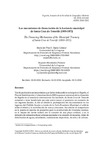Identificador persistente para citar o vincular este elemento:
https://accedacris.ulpgc.es/jspui/handle/10553/54014
| Título: | Los mecanismos de financiación de la hacienda municipal de Santa Cruz de Tenerife (1959-1972) | Otros títulos: | The financing mechanisms of the municipal treasury of Santa Cruz de Tenerife (1959–1972) | Autores/as: | Ojeda Cabrera, María del Pino F. Hernández Pacheco, Ruymán |
Clasificación UNESCO: | 55 Historia | Palabras clave: | Santa Cruz de Tenerife Hacienda municipal Ingresos Carta Económica Municipal Municipal treasury |
Fecha de publicación: | 2019 | Publicación seriada: | Vegueta: Anuario de la Facultad de Geografía e Historia | Resumen: | Tras la postración socioeconómica que había instaurado la autarquía en España, el Plan de Estabilización y Liberalización de 1959 supuso el comienzo de la alineación de España en el escenario internacional. La hacienda de Santa Cruz de Tenerife comenzó a verse beneficiada por este nuevo marco al promover un aumento de sus ingresos fiscales. A ello se añadió la participación del Ayuntamiento en los ingresos del Cabildo Insular a través de la Carta Económica Municipal, el arbitrio sobre el tabaco y la contribución de usos y consumos. Sus efectos se computaron en la puesta en marcha de proyectos para la construcción de viviendas sociales, en la mejora del frente costero con la creación de una playa artificial, y en la dotación de infraestructuras urbanas asociadas a la creación de escuelas, redes de distribución de aguas, alumbrado, instalaciones deportivas, de arte y de cultura. After the socioeconomic prostration established by autarchy in Spain, the Plan of Stabilization and Liberalization of 1959 was the beginning of Spain’s alignment with the international scene. The municipal treasury of Santa Cruz de Tenerife began to benefit from this new framework by promoting an increase in its tax revenues. To this was added the participation of the local government in the income of the Cabildo Insular, through the Carta Económica Municipal, the tax on tobacco and the contribution of habits of consumption. The effects of this can be measured by the implementation of social housing projects, improvements to coastal areas (including the creation of an artificial beach), and the resources devoted to urban infrastructure programmes associated with the creation of schools, water distribution networks, public lighting, and facilities for sports, art and culture. |
URI: | https://accedacris.ulpgc.es/handle/10553/54014 | ISSN: | 1133-598X | Fuente: | Vegueta: Anuario de la Facultad de Geografía e Historia [eISSN: 2341-1112], n. 19, p. 633-666 |
| Colección: | Artículos |
Visitas
53
actualizado el 10-ene-2026
Descargas
39
actualizado el 10-ene-2026
Google ScholarTM
Verifica
Comparte
Exporta metadatos
Los elementos en ULPGC accedaCRIS están protegidos por derechos de autor con todos los derechos reservados, a menos que se indique lo contrario.
